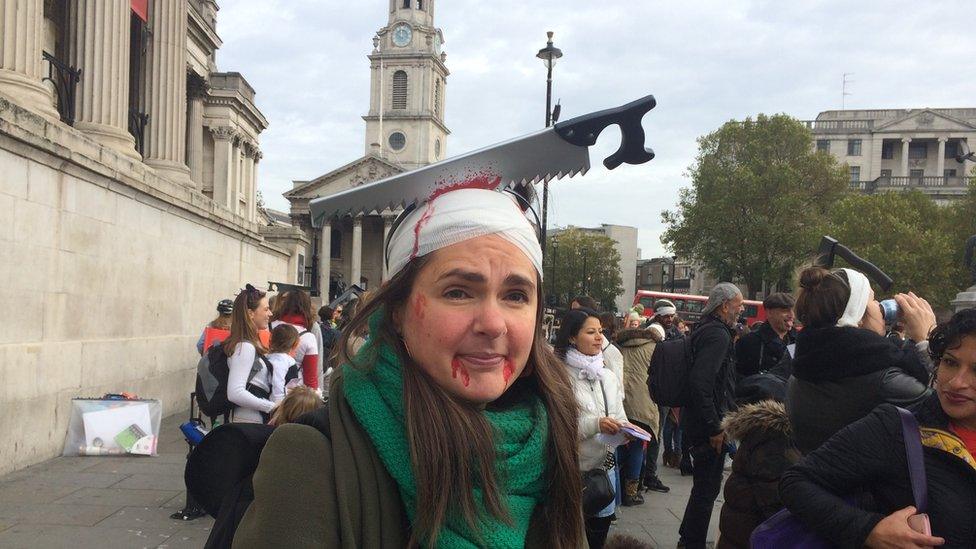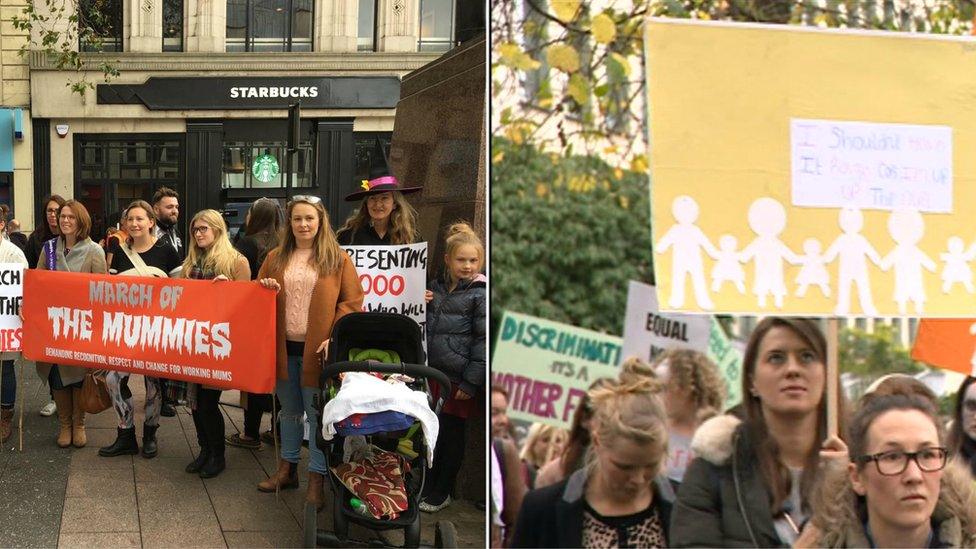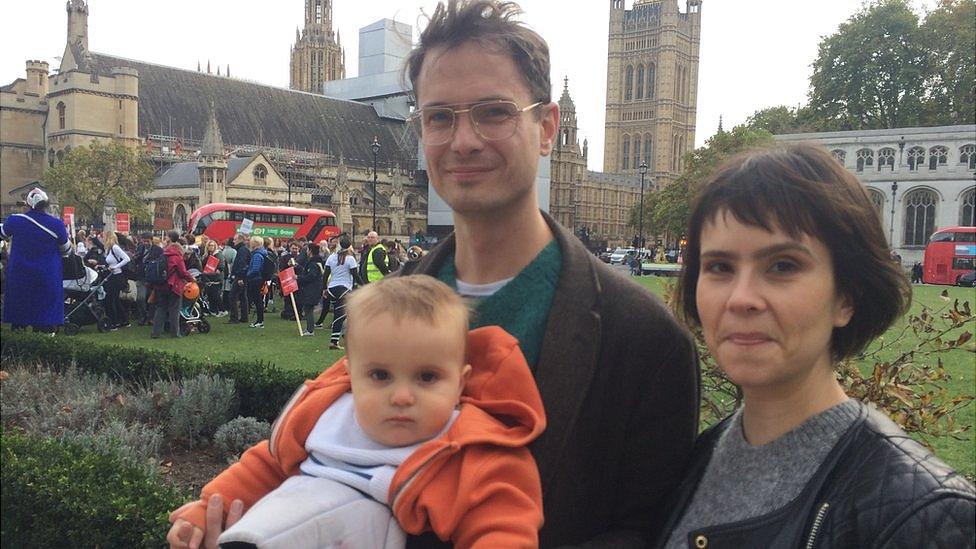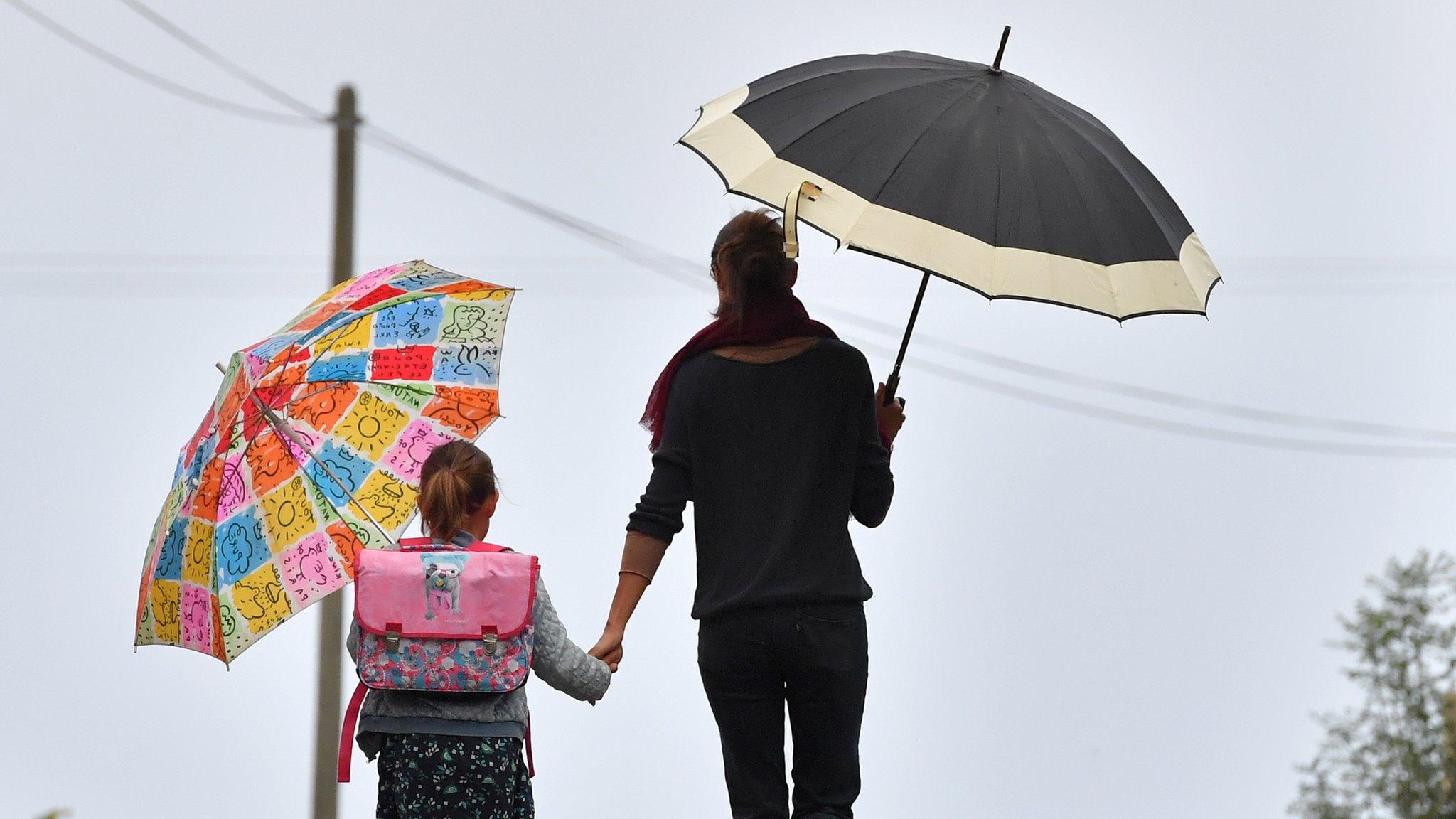'I don't want to give up my career to be a parent'
- Published
Halloween mummies march for maternity rights
"I don't want to have to give up my career to also be a parent," says mother-of-two Chloe Barton.
Chloe was one of about 250 campaigners who dressed up as Halloween mummies and took to the streets of London on Tuesday to campaign for better rights for working mothers.
A total of six rallies were held across the UK in Manchester, Belfast, Cardiff, Newcastle and Glasgow, organised by the pressure group Pregnant Then Screwed, external.
For Chloe, motherhood meant job change.

Mother-of-two Chloe says her dream job is no longer available to her
"I had tried very hard to keep up my practice as a self-employed barrister, but it just doesn't work with family and childcare hours.
"So I've recently taken the decision to become employed in the public sector because my dream career is no longer available for me.
"I really believe in equal parenting and co-parenting, and I think at the moment it's really very difficult for that to take place - at the moment women are the primary caregivers and I would like that to change for my daughters."
'Sackings, redundancies, demotions'
Joeli Brearley, mother-of-two and founder of Pregnant Then Screwed, has made it her mission to raise awareness of discrimination and to help women who are victims of discriminatory behaviour.

Joeli Brearley works to raise awareness of discrimination
"I've spoken to a lot of other mothers and I realised it [discriminatory behaviour] was happening all the time - sackings, redundancies, demotions, bullying, harassment.
"The whole system is a mess, it just doesn't work for working parents. We want to see the government tackle the underlying issues creating the problem."
Hatty Ashdown, a self-employed comedian, says working mothers often feel it's best not to mention that they have children.
"There's an unhealthy fear among mothers not to want to rock the boat.
"If I'm offered a casting, I just accept, I don't say, 'Let me just check childcare.' I feel, if I say that, they'll not put me at the top of the list.

Women also demonstrated in Cardiff and Newcastle
"I had an interview and I was conscious of not mentioning that I have a child and then the lady interviewing let slip she had a kid so I then felt OK to mention that I did too.
"I feel I've got to stand up for my friends who can't come today because they're in these awkward jobs and are scared to speak out."
Dads join the campaign
The rallies were not just attended by mothers - many fathers also showed their support.
Tim Todhunter, father of a 10-month-old baby, says he's never protested before, but feels mothers' rights need to be better protected.
"I know lots of women who've not been able to progress their careers because they're seen as a mother, almost as a risk.

Tim Todhunter joined the London rally
"It's terrible that women often have to lose their jobs or aren't favoured in their work just because they have a baby.
"I've never come on a protest before, but I feel like a lot of people have stopped and listened and hopefully we'll be able to work for change."
What changes does the group want to see?
Pregnant Then Screwed is using the rallies to call for five things:
increase the time limit for raising a tribunal claim from three months to at least six
require companies to report on how many flexible working requests are made and how many are granted
give both parents access to six weeks' parental leave paid at 90% of salary
give the self-employed access to statutory shared parental pay
subsidise childcare from six months old, rather than three years.
What does the government say about this?
A spokesman for the Department for Business, Energy and Industrial Strategy said: "The UK's maternity leave system is one of the most generous in the world, with eligible working parents able to benefit from up to 50 weeks of shared parental leave, a right to request flexible working and £2,000-a-year of tax-free childcare per child."
Most mothers are entitled to up to 52 weeks of leave and up to 39 weeks of guaranteed pay - nearly three times the minimum EU requirement, the spokesman added.
However, he stressed: "But let's be clear, discrimination in the workplace is illegal in any form and we are considering ways of ensuring new and expectant mums feel properly supported and protected at work."
Additional reporting by BBC reporter Joice Etutu
- Published26 September 2017
